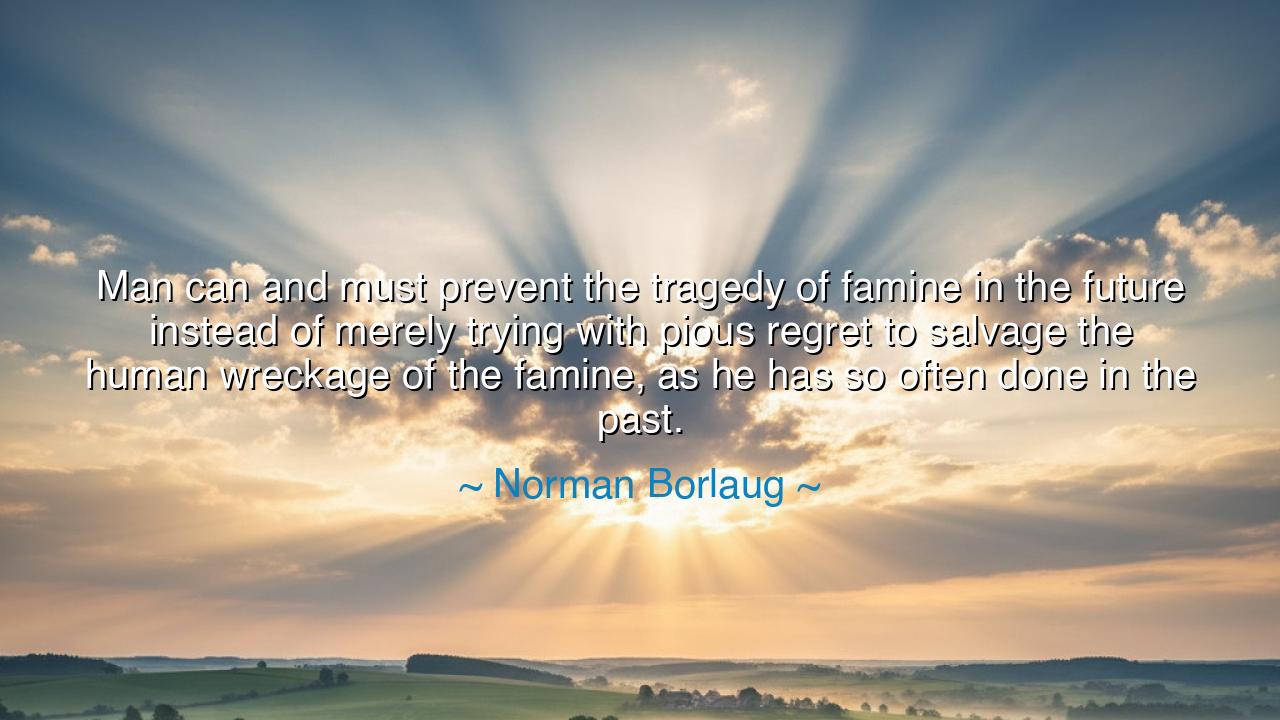
Man can and must prevent the tragedy of famine in the future
Man can and must prevent the tragedy of famine in the future instead of merely trying with pious regret to salvage the human wreckage of the famine, as he has so often done in the past.






Man can and must prevent the tragedy of famine in the future instead of merely trying with pious regret to salvage the human wreckage of the famine, as he has so often done in the past. These words, spoken by Norman Borlaug, a man whose legacy is marked by both triumph and tragedy, hold a deep and stirring challenge to the heart of mankind. They are not just words but a call to action, a summons to each generation that seeks to walk in the shadow of those who came before. Borlaug, a man of science, dedicated his life to the betterment of humankind, forever altering the path of agriculture and food security.
Let us look upon these words and understand them not merely as a reflection of past failures, but as a prophecy for the future. For Borlaug’s lament is not just about the hunger of a single generation, but about an ongoing struggle—one that has cost the lives of millions and threatens the existence of many more. His statement, filled with both sorrow and hope, implores humanity to rise above the despair of famine and to craft solutions that can prevent its return. It is not enough to merely feel sorrow after the fact; mankind must engage in the act of foresight, cultivating both wisdom and compassion before the tragedy unfolds. In doing so, we honor not only those who have suffered, but also those yet to come.
Consider the famine of Bengal in 1943, one of the most harrowing episodes of human suffering. Millions perished, and yet, the seeds of this calamity were sown long before the harvests failed. Political failures, social indifference, and the refusal to see suffering as preventable led to a disaster that echoed through the corridors of history. The tragedy was compounded not just by the lack of food, but by the lack of will to act decisively to prevent it. Borlaug’s words, centuries after, stand as a rebuke to this apathy: we must not merely lament the lost lives, but work towards a future in which such tragedies are unimaginable.
Borlaug, in his time, ushered in the Green Revolution, harnessing the power of scientific innovation to cultivate crops that could feed the hungry and transform nations. His work was not about temporary fixes but about creating sustainable solutions that would change the course of history. His philosophy was grounded in the belief that science, when aligned with humanity’s highest values, could do far more than merely alleviate suffering—it could prevent it altogether. In his eyes, the true tragedy of famine was not simply the hunger of the moment, but the neglect of foresight, the failure to act before the storm broke. And yet, despite all his efforts, we are still faced with hunger in many parts of the world today—an indication that his challenge remains unfinished.
Indeed, famine has always been with us—an insidious force, ever-present in the histories of our most vulnerable peoples. And yet, there have been moments in which humanity has come together to combat this force, to push it back from the brink. Consider the Marshall Plan, which sought to rebuild war-torn Europe after the devastation of World War II. By investing in agriculture, infrastructure, and social systems, nations worked not just to recover from the damage, but to build something better in its place. It was a moment in which foresight triumphed over regret, in which mankind rose up to meet the needs of the future rather than wallow in the miseries of the past.
This is the heart of Borlaug’s challenge to us all: that we must not be satisfied with simply picking up the pieces after disaster strikes. The future must be built with foresight—with the knowledge that, in the fight against famine, we are not simply engaging in a battle of survival, but in the work of hope. It is a challenge to governments, to scientists, to every human being, to invest in long-term solutions that address not just the symptoms of hunger, but its causes.
The lesson here is not one of despair, but of empowerment. Borlaug's life and words remind us that we have the power to shape the future. But it requires action. It requires us to look beyond the immediate crises and work tirelessly to build systems that are resilient, systems that can provide for the many and not just the few. Each of us must ask ourselves: what can I do today to prevent the famine of tomorrow? Whether through education, innovation, or simply cultivating a culture of compassion, we each have a role to play in making sure that the tragedy of famine becomes a thing of the past.
In the end, the challenge Borlaug set before us is one of legacy—how will we be remembered? Will it be for our ability to prevent suffering, to take action before it is too late? Or will it be for our regret, that we stood by while others perished, too absorbed in our comforts to heed the cries of the hungry? Let us answer with our actions, for the future is not an inheritance, but a gift we create with each step we take today.






AAdministratorAdministrator
Welcome, honored guests. Please leave a comment, we will respond soon